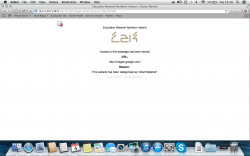Really? A school blocking Google because it has the ability to find "adult content" is asinine. Search engines have revolutionized the way scholarly materials are shared and open students up to ideas and research they would not have found otherwise. In all honesty it sounds more like lazy network admins than any type of school policy.
I say by-pass away, if they kick you out for navigating to an educational resource via a Google search then so be it. Take your story public and let them explain why they ruined a young students life over a Google search.
There are lots of ways to bypass the restrictions, the easiest being to use a proxy server and/or VPN. Given the fact that the admin was to lazy to block specific content and instead chose a blanket fix, it's likely they were to lazy to properly block those connection types as well.
However, if they did block those options, another solution(that is relatively new and over looked by security admins) is DNS Tunneling. I won't go into the exact details [plenty of documentation on the technique, try Google ;-)] but basically you need a computer of site connected to the internet that will act as a DNS server and accept dns queries. Your computer sends an encoded http request disguised as a dns request, a program on your "dns server" decodes the request, gathers the data, encodes it as a dns response, and sends it back to your computer for you to decide and read.
I have to agree here: Blocking useful academic tools, Google and YouTube included, as a singular is absurd. I can see more of the point of YouTube, as 99.9% of the content is useless, but Google is absolutely needed for any practical use of the Internet at our present point in time.
What they should do is block specific google URL types, if they are majorly worried about adult content, but to be honest, we aren't speaking of a campus where anyone hasn't seen any of this in their lives, and viewing naughty photos on google images versus. needing to do research is a simple, flat, equation. The need for a viable search protocol outweighs the possibility of using it with non-academic intent.
I suggest TOR for you in any regard. You may also wish to consult with the system administrators for your college and ask why they are blocking legitimate Internet facilities, and not providing a suitable substitute.
Will they block Wikipedia next, because it has information on topics they don't appreciate? How about the Cambridge websites, in case anyone wants to research middle-english swear words?
Where do you draw the line?
Have you discussed this at all with those in control of the service?
One thing that analysis of that profile file may give you is the name of their SSID, and any login details (that you may need to decrypt), that would allow access without the .profile document, so that you can use a different device to bypass security, running macchanger, in the eventuality that they find that you have been using the system 'inappropriately'; whereby you can show on your primary device that you are not, and keep all workarounds on a second system that they don't know about, or on the same system, on a USB boot device, etc..
If their security system uses MAC address recognition in an allow/deny list, and not basic encryption, then you have a different problem, as once you change the MAC address, your system will not be able to connect to the network.
In an ideal situation, MAC allow/deny authentication is far more secure than WPA2, and if youwant to use WWAN/WLAN, it is wise to use both WPA2 and MAC filtration. Either can be broken, but it is easier to BF decrypt a WPA2 key, using a simple four-way handshake, than it is to do that in addition to needing the correct MAC address for that key.
It is likely they aren't using the finest tools to do this, and that the configuration, being new, is using default parameters. That is one good reason to visit whomever is in charge of this department and schedule a meeting with them to discuss your concerns. I would target legitimate, academic uses if you do this.


